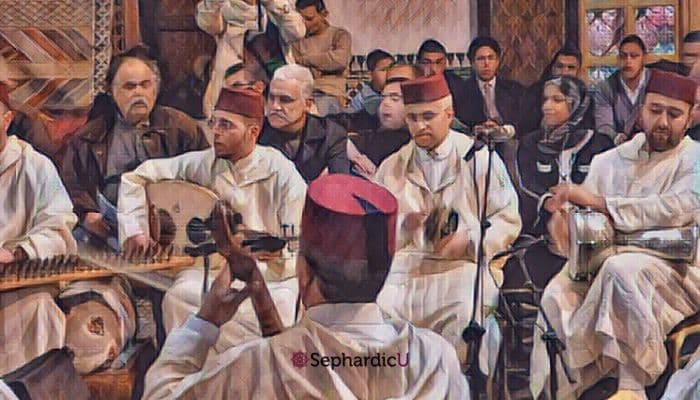From Ottoman Empire to Worldwide Awareness

Sephardic music derives from the musical traditions of Jewish communities in medieval Spain and Portugal. It has since absorbed influences from Morocco, Greece, Bulgaria, and other places where Spanish and Portuguese Jews settled following their expulsion from Spain in 1492 and Portugal in 1496. Lyrics were preserved by Jewish communities formed after their expulsion from the Iberian Peninsula. Many of the lyrics and poems are shared by these Sephardic communities, but the melodies vary greatly.
The music of the Sephardic Jewish community is referred to collectively as “Sephardic music.” Sephardic Jews have a rich repertory, most of which has its roots in the Mediterranean region. Material is typically performed in Judeo-Spanish dialects in the secular tradition, but Hebrew, Turkish, Greek, and other regional languages of the Sephardic diaspora are also frequently employed. The liturgical and para-liturgical traditions of the Sephardim are geographically distinct.
The musical practices of the Jewish communities in medieval Spain and Portugal are where the roots of sefardic music can be found. Since then, it has absorbed elements from Morocco, Greece, Bulgaria, and other locations where Spanish and Portuguese Jews established themselves following their expulsion from those countries in 1492 and 1496, respectively. Communities established by Jews who had been driven from the Iberian Peninsula had retained lyrics. The lyrics and poems of these Sephardic groups are frequently the same, yet the melodies differ greatly.
Instrumentation
Sephardic music is predominantly vocal, including pan-Sephardic music, which may or may not be Judeo-Spanish. When used, instruments are played to accompany tunes. The instruments that Sephardim have traditionally utilized have largely reflected the instruments of the host culture: (Greek, Ottoman, Moroccan, etc.) The most popular musical instruments are the Assyrian kanun or santur (plucked or hammered Middle Eastern zither), violin, hand drums, and plucked lutes (fretless: oud, the Middle Eastern lute; and in what is now Turkey fretted saz or occasionally mandolin or cumbus) (frame and goblet).
In the same way that the Jewish community employs talented Muslim musicians for weddings and other occasions, musicians from the Muslim community may also be employed. In most cases, Sephardic men played both melodic and local percussion instruments, whereas women typically sang alone in home settings and at weddings, accompanied by tambourines and perhaps other percussion instruments. In a manner evocative to contemporary Spanish and Portuguese village customs, Molho recalls Sephardic women in Salonica playing spontaneous percussion with kitchen implements. (Molho 2021) Female drummers and singers who performed only for weddings were known as tanyederas in the eastern Mediterranean. They were an essential part of the bridal festivities.
Like other traditional artists, Sephardim frequently modify their instruments to fit modern standards; during a contemporary Sephardic wedding, one is unlikely to hear any medieval instruments but is more likely to hear an electronic keyboard.
Visually interact and learn about our nearly 6000 year history.
An interactive tour through our rich heritage spanning from 900 B.C.E.
Learn about our numbers, languages and population.
The greatest minds, philosophers and authors of their time.
Everything you wanted to know about Sephardic customs.
Learn our traditions for brit to marriage and bereavement.
Food is the universal thing that has the power to bring people together.
Listen to the rich repertory of Sephardi music and prayers.
Connect to our calendar for the latest events and happenings.
Read real-time updates as the relates to the Sephardic world.
We welcome you to join us virtually for Shacharit and Arvit.
Make new friends while expanding your mind. Quarterly. Join now.
View the full list of every Jewish holiday and observance.
Browse through our recommended reading list of over 100 books.
Download our guides to help you plan for the Holidays.
We welcome all in need of prayer, healing or Kaddish.

Login to your account
Get notified about new articles